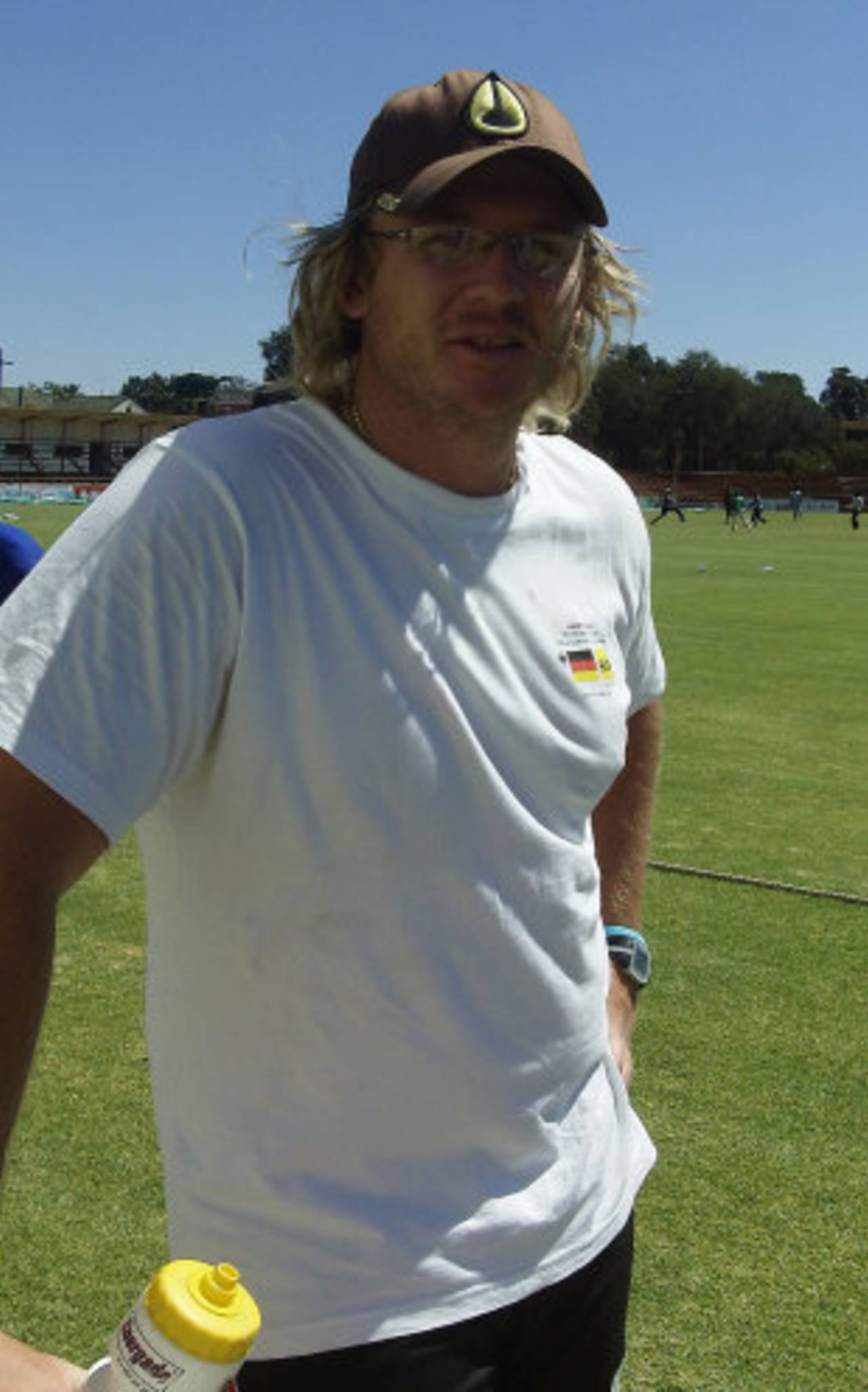Gavin Ewing comes home
Gavin Ewing got married on May 26 in the Queens Sports Club's Presidential Suite in typical Zimbabwean uniform - not traditional wedding wear
Firdose Moonda
25-Feb-2013

Gavin Ewing: "I think we [Zimbabwe] can do a lot more in club cricket so that the competitive edge starts there, not when players get to franchise or national level." • ESPNcricinfo Ltd
Gavin Ewing got married on May 26 in the Queens Sports Club's Presidential Suite in typical Zimbabwean uniform - not traditional wedding wear. He wore pin-striped white shorts, a plain white shirt and flip-flops, while his bride, Agata, chose a summery, knee-length dress - perfect for riding on the Harley-Davidson the couple zoomed off on later. Unconventional, yes, but there was a good reason for it.
"There's nothing like home," Ewing told ESPNCricinfo, and he would know. After walking away from Zimbabwe as a rebel in 2005, he spent three years playing everywhere from Auckland to Dhaka, but nothing was as good as being home.
Ewing is one of the lesser known members of Zimbabwe's player walkout, having played only ten international matches, but he played no lesser role in the saga and is honest about his reasons for becoming involved in the protest. "Politically, there were a lot of arguments about selection and it seemed like the right thing to do at the time," he said.
The whisper of ruing his decision soon became a deafening shriek and Ewing had to heed it. He was doing the odd coaching job, playing in various clubs in New Zealand and Australia and even tried a stint in England, but he wanted to go back. Luckily, things were improving in Zimbabwean cricket and he could. "I regretted leaving, and I felt that to come back and have another crack at it was worthwhile," he said. "I liked the idea of the franchise system and I think it's worked. And I'm glad that I did come back." Ewing captains the Matabeland Tuskers, who won the first-class competition, the Logan Cup, last season.
Like so many of the returning players who have found a place in the new system, albeit a very different place in the case of some like Heath Streak and Alistair Campbell, Ewing is heartened by what he sees on the ground now. "To have come back and to see the positive attitude among players is a fantastic thing," he said. He acknowledges that "there are some teething problems, "the most concerning of which is the delay in payment of match fees to national players". "It's hard when the national players come home and are frustrated because they are not getting what they're due, but having said that it is getting better."
Ewing said that most of the players understand that they have little control over the financial situation, so they are trying to apply themselves where they can force change - on the field. With many of them having had experience in other countries, they bring with them knowledge from afar, that Ewing said is making a difference to the quality of the cricket being played in Zimbabwe.
His pearl of wisdom, which comes from his time in Australia, has not been applied yet, but he hopes that soon it will be. "I learnt was how competitive their club cricket was," he said. "The biggest let down in Zimbabwe is that our franchise system is really good, but I think we can do a lot more in club cricket so that the competitive edge starts there, not when players get to franchise or national level."
Zimbabwe's club cricket was the area that suffered most when their cricket spiralled speedily downwards in 2007 and 2008. There are reports of some clubs in smaller towns that have no money to maintain their fields, which are overgrown, and others that simply have no money to function and have shut down. Ewing thinks that if the club's structures can be improved, Zimbabwe will be sowing the seeds for a decent future. "From a young age people must be competitive and they should want to perform every time they walk out on the field. Club cricket was played as though it was first-class cricket there [in Australia and New Zealand], but here we are very soft when we play club cricket. We only step up when we play franchise cricket. If we want to keep performing and improving on an international stage we have to do improve that."
Perhaps Ewing's advice won't be taken seriously until the national team hits a speedbump or three, and he is mindful of that. "If the team is winning, people can't complain. At the moment the guys are doing well and doing us proud, and it's good to watch them."
Almost as good as being back home. What would make it even better, Ewing says, if he can return to the national fold, because he still harbours ambitions of walking out to represent the land he once left behind. "I've had two really good seasons [in franchise cricket] and scored lots of runs. The problem is the batters in the [national] side are also scoring lots f runs, so I've just got to bide my time and hope for opportunities, and when they come, grab them. And if they don't come, as long as the team is winning, I won't complain."
Firdose Moonda is ESPNcricinfo's South Africa correspondent